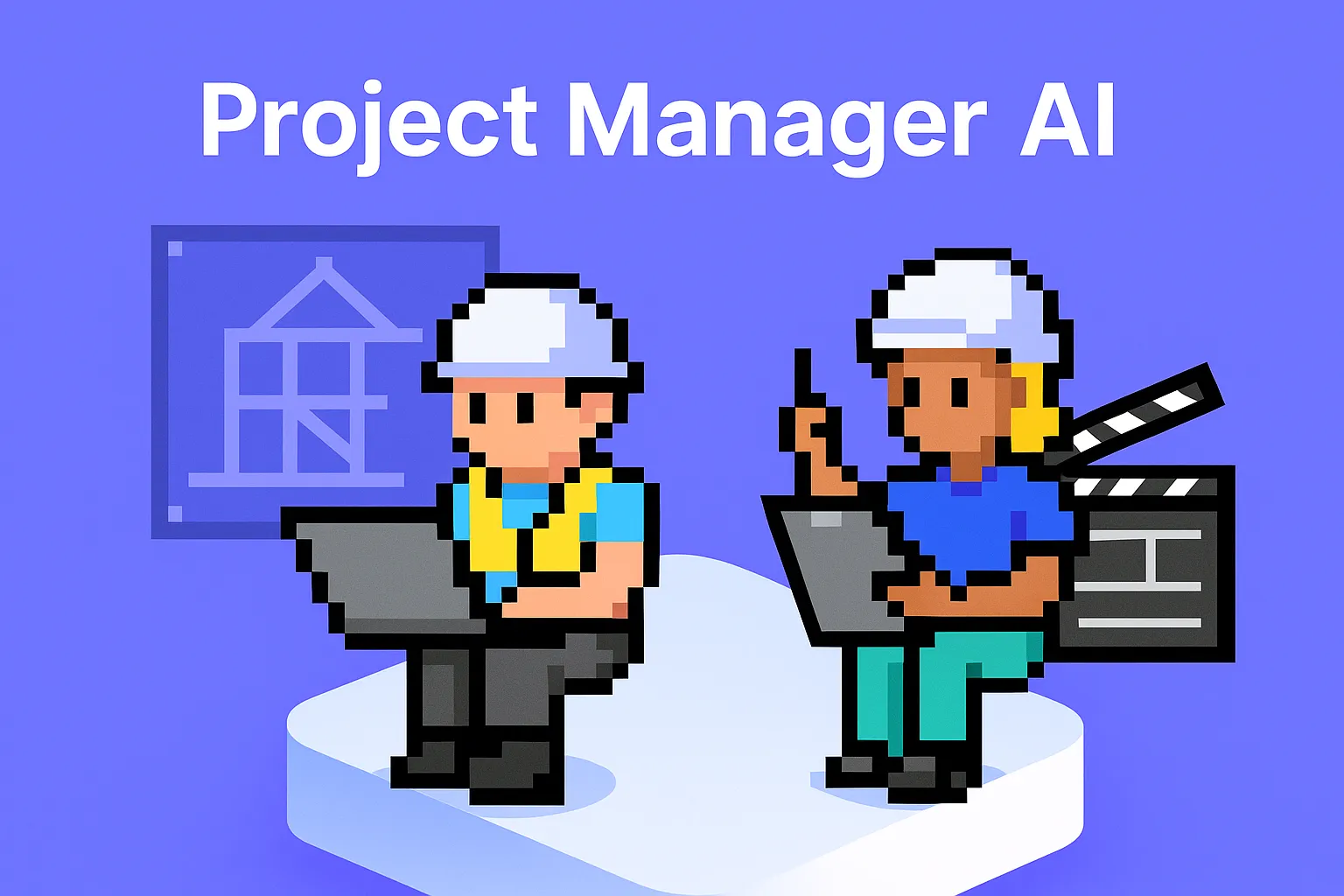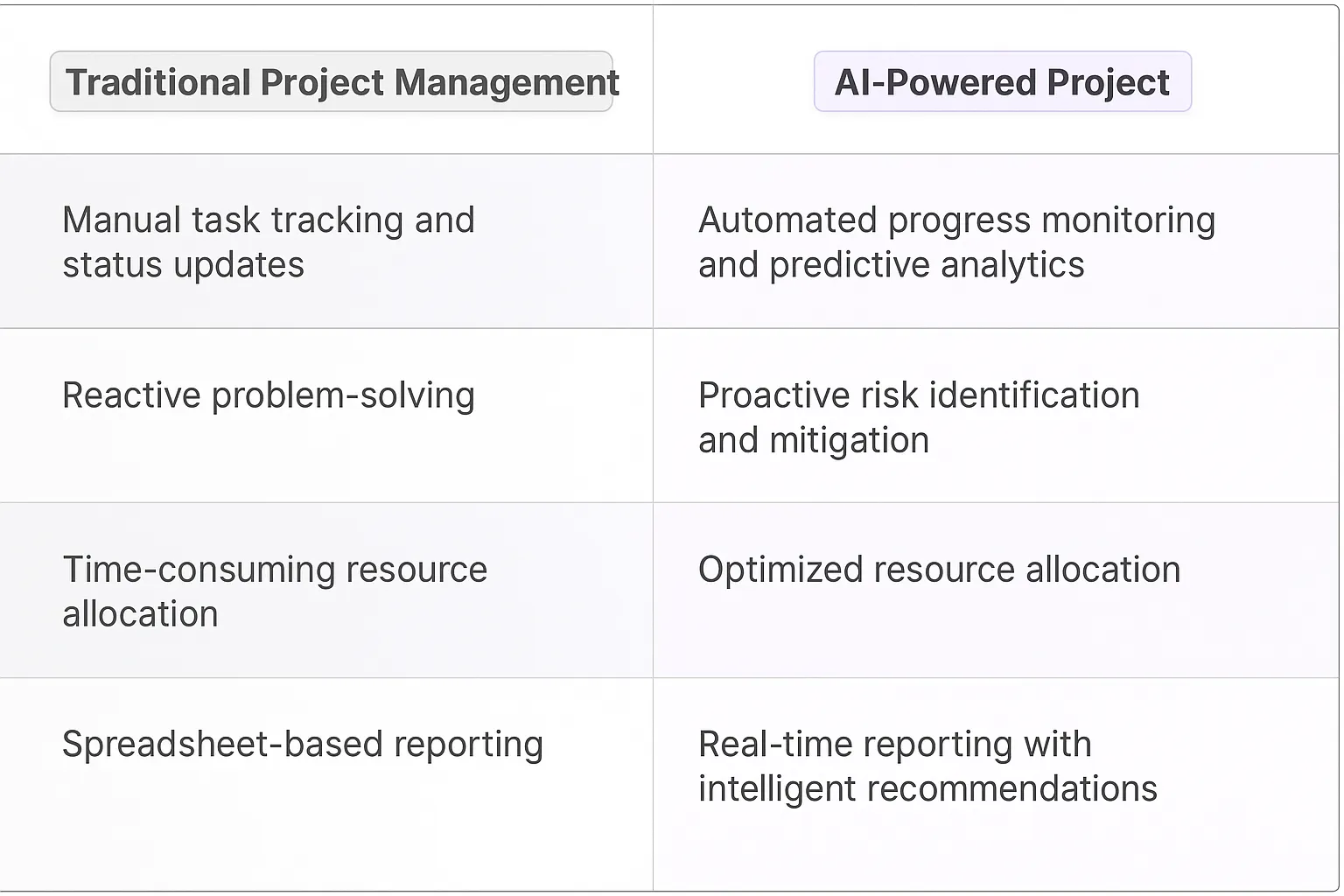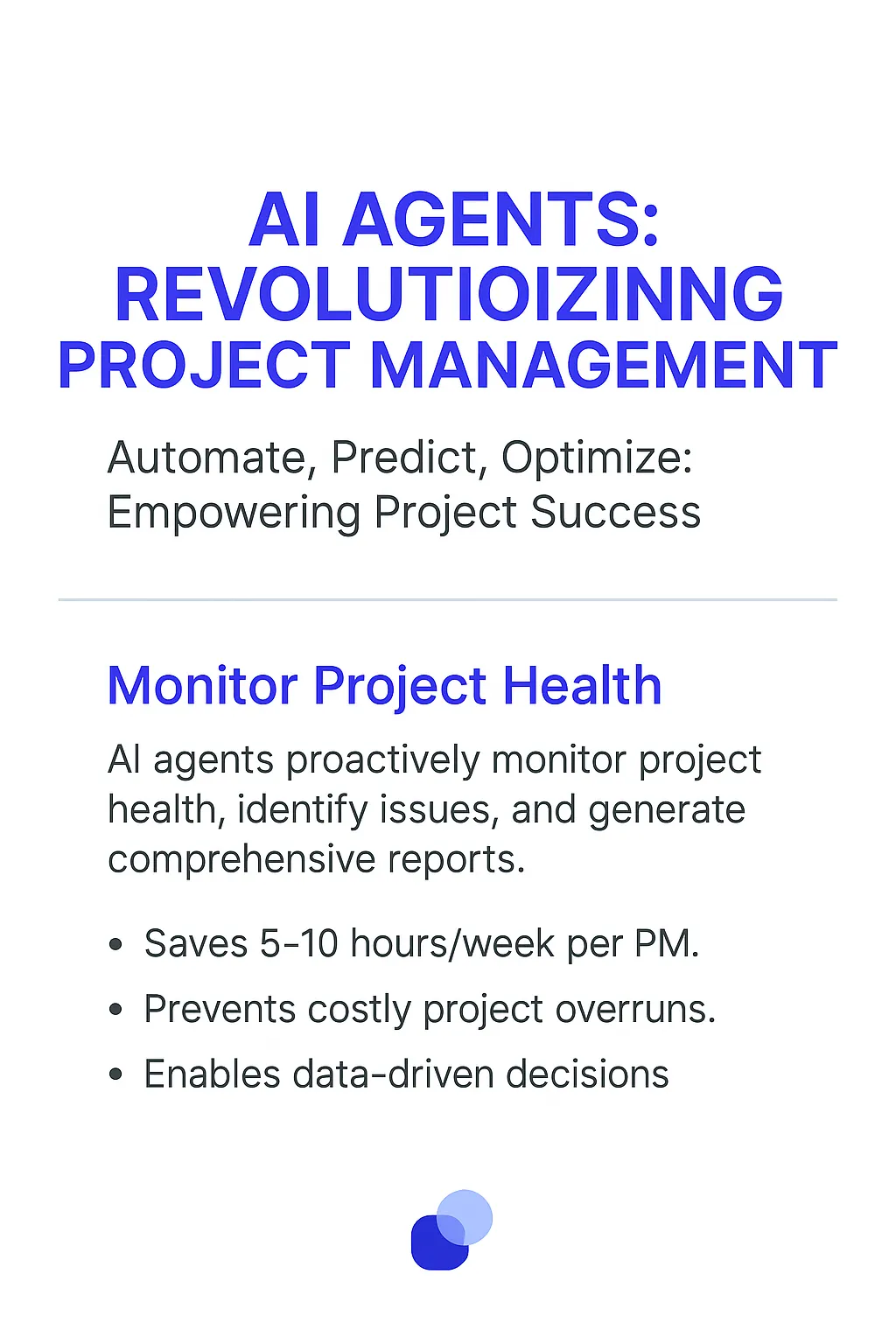Project Manager AI is a sophisticated software system that uses artificial intelligence to assist in planning, executing, and monitoring projects. It's like having a tireless, data-crunching teammate who's always on, always learning, and always three steps ahead. These AI agents can analyze vast amounts of project data, optimize resource allocation, predict potential issues, and automate routine tasks, freeing up human project managers to focus on high-level strategy and team leadership.
Project Manager AI comes packed with features that set it apart from traditional project management tools:1. Predictive Analytics: It can forecast project outcomes and flag potential delays or budget overruns before they happen.2. Natural Language Processing: It can parse team communications, extract action items, and even gauge team sentiment.3. Resource Optimization: It can assign tasks based on team members' skills, availability, and past performance.4. Automated Reporting: It can generate status updates and reports without manual input.5. Risk Management: It continuously monitors project data to identify and suggest mitigation strategies for potential risks.6. Adaptive Learning: It improves its performance over time by learning from each project it manages.

Before AI agents entered the scene, project managers relied on a hodgepodge of tools and techniques to keep their teams on track. We're talking about spreadsheets that stretched for miles, Gantt charts that looked like abstract art, and an endless stream of status update meetings that left everyone feeling drained.
Project managers were the human glue holding everything together, constantly juggling tasks, deadlines, and team dynamics. They'd spend hours manually updating project timelines, chasing down team members for updates, and trying to predict potential roadblocks. It was a high-wire act that often led to burnout and missed opportunities.
Enter AI agents, the digital teammates that are transforming project management from a reactive scramble to a proactive strategy. These AI-powered tools are like having a tireless assistant who's always on, always learning, and always three steps ahead.
First off, AI agents are data-crunching machines. They can analyze vast amounts of project data in seconds, spotting patterns and potential issues that human eyes might miss. This means project managers can make decisions based on real-time insights, not gut feelings or outdated information.
But it's not just about number-crunching. AI agents are getting scary good at natural language processing. They can sift through team communications, parse out action items, and even gauge team sentiment. Imagine an AI that can tell you which team members are feeling overwhelmed before they burn out, or which parts of the project are causing the most friction.
Resource allocation? AI agents have got that covered too. They can optimize task assignments based on team members' skills, availability, and past performance. No more square pegs in round holes.
Perhaps the most game-changing benefit is predictive analytics. AI agents can forecast project outcomes with uncanny accuracy, flagging potential delays or budget overruns before they happen. It's like having a crystal ball, but one that's powered by algorithms instead of magic.
And let's not forget about the time savings. AI agents can automate routine tasks like scheduling, report generation, and even basic team communication. This frees up project managers to focus on high-level strategy and team leadership – you know, the stuff that actually moves the needle.
The bottom line? AI agents are turning project managers into strategic powerhouses. They're not replacing human judgment; they're enhancing it, allowing project managers to operate at a higher level of insight and efficiency. In the world of project management, AI isn't just a nice-to-have – it's quickly becoming the price of entry for staying competitive.

Project managers, listen up. AI agents are about to become your secret weapon in the battle against complexity and chaos. These digital teammates can tackle the grunt work that's been bogging you down, freeing you up to focus on the high-level strategy and team leadership that really moves the needle.
Let's break down some key processes where AI agents can make a real difference:
Now, let's zoom in on some specific tasks where AI agents can really shine:
The key here is to view AI agents not as replacements, but as amplifiers of your project management superpowers. They're not here to take your job; they're here to help you do your job better than ever before.
As you integrate these AI agents into your workflow, you'll find yourself spending less time on administrative busywork and more time on the strategic thinking and team leadership that truly drive project success. It's not about working harder; it's about working smarter, with AI as your trusted sidekick.
Remember, the most successful project managers of the future won't be those who resist this technology, but those who embrace it, master it, and use it to elevate their game to new heights. So, are you ready to level up your project management skills with AI? The future is here, and it's time to seize it.

Project Manager AI agents are reshaping how teams execute complex initiatives across sectors. These digital teammates bring a unique blend of data-driven insights and adaptive task management that's proving invaluable in diverse business environments. Let's dive into some concrete examples of how these AI-powered project managers are transforming workflows in different industries.
From construction sites to software development sprints, these AI agents are becoming indispensable partners in keeping projects on track, resources optimized, and stakeholders aligned. They're not just glorified to-do lists; they're sophisticated systems that learn from each project, anticipate bottlenecks, and suggest course corrections in real-time.
What's particularly fascinating is how these AI project managers adapt their approach based on the nuances of each industry. They're equally at home managing the supply chain intricacies of manufacturing as they are juggling the creative demands of marketing campaigns. This versatility stems from their ability to process vast amounts of industry-specific data and apply it contextually to each unique project scenario.
In the following examples, we'll explore how Project Manager AI agents are tackling industry-specific challenges, from regulatory compliance in finance to agile methodology in tech startups. These use cases illustrate not just the efficiency gains, but also how AI is enabling entirely new approaches to project management that were previously impractical or impossible for human managers alone.
The construction industry is ripe for disruption, and AI project managers are the wrecking ball we've been waiting for. These digital teammates aren't just pushing papers; they're pushing boundaries.
Picture a massive skyscraper project in downtown Manhattan. Traditionally, human project managers would be drowning in a sea of blueprints, vendor contracts, and city regulations. Enter the AI project manager - let's call it SkyScraper AI.
SkyScraper AI doesn't sleep, doesn't take coffee breaks, and certainly doesn't get overwhelmed by the sheer volume of data. It's constantly crunching numbers, analyzing weather patterns, monitoring supply chain disruptions, and predicting potential bottlenecks before they even materialize.
But here's where it gets interesting. SkyScraper AI isn't just reacting; it's proactively optimizing. It's using machine learning algorithms to suggest the most efficient sequencing of tasks, taking into account everything from crane availability to concrete curing times. It's like having a project manager with a crystal ball and a supercomputer for a brain.
And let's talk about risk management. In construction, unforeseen issues can send budgets spiraling and timelines stretching. SkyScraper AI is constantly running simulations, identifying potential risks, and suggesting mitigation strategies. It's not just managing a project; it's playing 4D chess with steel and concrete.
But the real game-changer? Communication. SkyScraper AI acts as a central hub, ensuring that everyone from the architects to the electricians is on the same page. It's translating complex technical jargon into clear, actionable insights for stakeholders. No more "lost in translation" moments that can cost millions.
The result? Projects completed faster, under budget, and with fewer surprises. We're talking about shaving months off construction times and millions off budgets. In an industry where time literally is money, that's not just an improvement - it's a revolution.
AI project managers in construction aren't replacing humans; they're augmenting them. They're freeing up human creativity to focus on the big picture while handling the granular details with superhuman precision. It's not about building faster; it's about building smarter.
As we look to the future, the skylines of our cities won't just be shaped by architects and engineers, but by the invisible hand of AI project managers. And that's a view worth building towards.
The film industry is about to experience its biggest plot twist yet, and AI project managers are the unexpected heroes. These digital teammates are set to transform how movies are made, from pre-production to the final cut.
Let's zoom in on a big-budget sci-fi blockbuster. Traditionally, film production has been a chaotic dance of creatives, technicians, and logistics experts. Now, enter CinemaAI, our AI project manager extraordinaire.
CinemaAI doesn't just manage schedules; it orchestrates a symphony of moving parts. It's analyzing script breakdowns, optimizing shooting schedules based on actor availability, weather forecasts, and even predicting potential CGI bottlenecks months in advance.
But here's where it gets really interesting. CinemaAI is learning from every production it manages. It's identifying patterns in successful shoots, flagging common pitfalls, and even suggesting creative workarounds for budget constraints. It's like having a veteran producer with decades of experience, but one that never forgets a detail and is always up-to-date with the latest industry trends.
Risk management in film production is a whole different ballgame, and CinemaAI is changing the rules. It's constantly running simulations of the entire production process, identifying potential issues before they arise. Sudden change in location permit? CinemaAI has already lined up three alternatives. Key actor falls ill? It's already recalculated the shooting schedule to minimize disruption.
The real magic happens in post-production. CinemaAI is tracking every frame, every VFX shot, every sound edit. It's predicting render times, optimizing workflow between different departments, and even suggesting edits based on early audience reactions. We're talking about turning months of post-production into weeks, without sacrificing quality.
But let's be clear: CinemaAI isn't replacing the creative genius of directors or the intuition of seasoned producers. It's amplifying their abilities, freeing them from logistical nightmares to focus on storytelling. It's not about making movies faster; it's about making better movies.
The impact? We're looking at more ambitious projects becoming feasible, indie films stretching their budgets further, and a general democratization of high-quality filmmaking. The next Spielberg or Nolan might emerge not just because of their vision, but because an AI project manager made that vision achievable within budget constraints.
As we look to the future of cinema, the credits won't just roll for the cast and crew, but for the AI project managers that made the magic possible behind the scenes. And that's a future worth watching.
Implementing a Project Manager AI Agent isn't just about slapping some code together and calling it a day. We're talking about a complex system that needs to juggle multiple tasks, timelines, and team dynamics. One of the biggest hurdles? Data integration. Your AI needs to pull information from various sources - task management tools, communication platforms, and even email. It's like trying to get a group of cats to march in formation.
Then there's the issue of natural language processing. Your AI needs to understand context, nuance, and even sarcasm in team communications. It's not just about recognizing words; it's about grasping the underlying meaning. And let's not forget about decision-making algorithms. Your AI needs to prioritize tasks, allocate resources, and make judgment calls. It's like teaching a computer to think like a seasoned project manager who's been in the trenches for decades.
On the operational side, we're dealing with a whole different beast. First up: team adoption. You might have the most sophisticated AI in the world, but if your team treats it like that weird cousin no one talks to at family gatherings, you're dead in the water. You need to create a culture where the AI is seen as a valuable team member, not a glorified Clippy.
Then there's the trust factor. Can your team rely on an AI to make critical project decisions? It's one thing to have an AI schedule meetings, but it's another to have it decide which features to cut from a product launch. You're asking people to put their professional reputations in the hands of an algorithm. That's a tough sell.
Lastly, we can't ignore the elephant in the room: job displacement fears. Introducing a Project Manager AI Agent isn't just a technical challenge; it's a change management nightmare. You need to navigate the tricky waters of reassuring your human project managers that they're not being replaced while also pushing for adoption of the new technology. It's like trying to convince turkeys to vote for Thanksgiving.
Project Manager AI agents are more than just a technological advancement; they're a paradigm shift in how we approach project management. They're turning project managers into strategic powerhouses, allowing them to operate with unprecedented insight and efficiency. But it's not all smooth sailing. Implementing these AI agents comes with significant technical and operational challenges. From data integration issues to team adoption hurdles, organizations need to navigate carefully to reap the full benefits.Despite these challenges, the potential rewards are too significant to ignore. As AI technology continues to evolve, we can expect these digital teammates to become even more sophisticated and indispensable. The future of project management isn't just about AI – it's about the symbiosis between human creativity and AI-powered efficiency. The project managers who will thrive in this new landscape won't be those who resist this technology, but those who embrace it, master it, and use it to elevate their game to new heights. The AI revolution in project management isn't coming – it's already here. The question is: are you ready to level up?